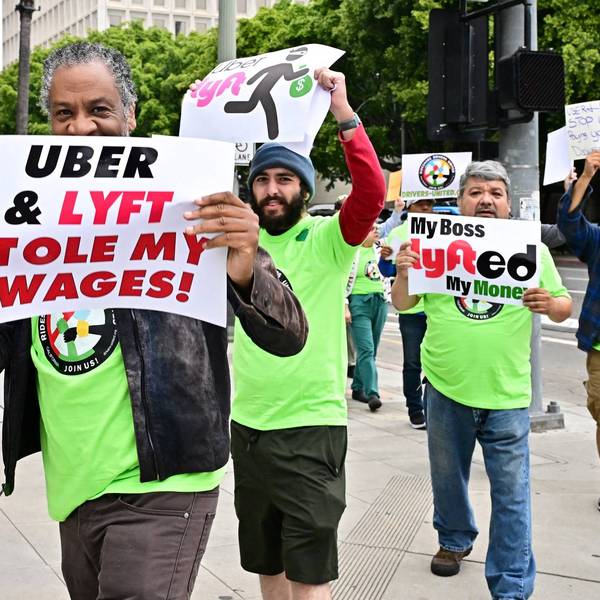Lawsuit Challenges State's "Immoral, Unjust, Illegal" Law Banning Local Wage Increases
'If the legislature and governor hadn’t illegally stolen my raise, I would have had money to pay for my son's child care,' worker in Birmingham, Ala. says.
Workers in Birmingham have launched a federal civil rights lawsuit charging that a fast tracked bill signed into law by Alabama Gov. Robert Bentley that blocked the city's minimum wage increase is "tainted with racial animus" and violates the equal protection clause of the U.S. Constitution.
Plaintiffs include fast-food workers, as well as the Alabama NAACP and Greater Birmingham Ministries.
Among the plaintiffs is 23-year-old Marnika Lewis, a restaurant worker who is paid $7.75 an hour. "I can't afford to feed my son or heat my home on the $270 I'm paid each week, so I have to rely on public assistance just to scrape by. If the legislature and governor hadn't illegally stolen my raise, I would have had money to pay for my son's child care," she said in a press statement.
As Common Dreams reported in February, days before the predominantly black city was to begin implementing incremental increases towards a $10.10 minimum wage, thanks to a city council-passed ordinance, state lawmakers fast tracked a bill, HB174, to block it and any other city's attempt to raise the wage . It was swiftly passed by Gov. Bentley.
City Council President Johnathan Austin then called the bill "a clear indication that the plight of the working class is of no relevance to the GOP."
The new lawsuit, filed Thursday in the U.S. District Court in Birmingham, argues: "The exercise of complete control over regulation and policy pertaining to wages, leave or other employment benefits can be directly traced to provisions in the racially discriminatory 1901 Constitution that deprives black citizens the right to regulate such matters of central concern to their daily lives."
"Such provisions that grant exclusive authority to the State legislature to override any and all local ordinances are vestiges of race discrimination and HB 174 disproportionately impacts African American residents who live and work in the City of Birmingham," it continues.
Added Benard Simelton, president of the Alabama State Conference of the National Association for the Advancement of Colored People, "The state's move to block Birmingham's minimum wage increase was not only unjust and immoral, it was illegal too." As the plaintiffs charge in their suit, in addition to violating U.S. equal protection laws, the state legislature did not follow legally required notice procedures in their attempt to speed it through.
"Over 70 percent of the people that would have benefited from this raise are African-American, poor, minorities," Simelton told AL.com. "We think there's some racial intent there to overturn the decision of city government in Birmingham, to keep minorities and African-Americans poor."
The plaintiffs are seeking an injunction prohibiting the state from enforcing the bill, or taking another action that would block the wage increase.
The Massachusetts Institute of Technology's Living Wage Calculator estimates that, in Jefferson County, where Birmingham is located, an individual without children would need to earn $10.36 per hour working 40 hours per week to support their household needs.
Alabama, along with Louisiana, Mississippi, South Carolina, and Tennessee, have no state minimum wage.
An Urgent Message From Our Co-Founder
Dear Common Dreams reader, The U.S. is on a fast track to authoritarianism like nothing I've ever seen. Meanwhile, corporate news outlets are utterly capitulating to Trump, twisting their coverage to avoid drawing his ire while lining up to stuff cash in his pockets. That's why I believe that Common Dreams is doing the best and most consequential reporting that we've ever done. Our small but mighty team is a progressive reporting powerhouse, covering the news every day that the corporate media never will. Our mission has always been simple: To inform. To inspire. And to ignite change for the common good. Now here's the key piece that I want all our readers to understand: None of this would be possible without your financial support. That's not just some fundraising cliche. It's the absolute and literal truth. We don't accept corporate advertising and never will. We don't have a paywall because we don't think people should be blocked from critical news based on their ability to pay. Everything we do is funded by the donations of readers like you. Will you donate now to help power the nonprofit, independent reporting of Common Dreams? Thank you for being a vital member of our community. Together, we can keep independent journalism alive when it’s needed most. - Craig Brown, Co-founder |
Workers in Birmingham have launched a federal civil rights lawsuit charging that a fast tracked bill signed into law by Alabama Gov. Robert Bentley that blocked the city's minimum wage increase is "tainted with racial animus" and violates the equal protection clause of the U.S. Constitution.
Plaintiffs include fast-food workers, as well as the Alabama NAACP and Greater Birmingham Ministries.
Among the plaintiffs is 23-year-old Marnika Lewis, a restaurant worker who is paid $7.75 an hour. "I can't afford to feed my son or heat my home on the $270 I'm paid each week, so I have to rely on public assistance just to scrape by. If the legislature and governor hadn't illegally stolen my raise, I would have had money to pay for my son's child care," she said in a press statement.
As Common Dreams reported in February, days before the predominantly black city was to begin implementing incremental increases towards a $10.10 minimum wage, thanks to a city council-passed ordinance, state lawmakers fast tracked a bill, HB174, to block it and any other city's attempt to raise the wage . It was swiftly passed by Gov. Bentley.
City Council President Johnathan Austin then called the bill "a clear indication that the plight of the working class is of no relevance to the GOP."
The new lawsuit, filed Thursday in the U.S. District Court in Birmingham, argues: "The exercise of complete control over regulation and policy pertaining to wages, leave or other employment benefits can be directly traced to provisions in the racially discriminatory 1901 Constitution that deprives black citizens the right to regulate such matters of central concern to their daily lives."
"Such provisions that grant exclusive authority to the State legislature to override any and all local ordinances are vestiges of race discrimination and HB 174 disproportionately impacts African American residents who live and work in the City of Birmingham," it continues.
Added Benard Simelton, president of the Alabama State Conference of the National Association for the Advancement of Colored People, "The state's move to block Birmingham's minimum wage increase was not only unjust and immoral, it was illegal too." As the plaintiffs charge in their suit, in addition to violating U.S. equal protection laws, the state legislature did not follow legally required notice procedures in their attempt to speed it through.
"Over 70 percent of the people that would have benefited from this raise are African-American, poor, minorities," Simelton told AL.com. "We think there's some racial intent there to overturn the decision of city government in Birmingham, to keep minorities and African-Americans poor."
The plaintiffs are seeking an injunction prohibiting the state from enforcing the bill, or taking another action that would block the wage increase.
The Massachusetts Institute of Technology's Living Wage Calculator estimates that, in Jefferson County, where Birmingham is located, an individual without children would need to earn $10.36 per hour working 40 hours per week to support their household needs.
Alabama, along with Louisiana, Mississippi, South Carolina, and Tennessee, have no state minimum wage.
Workers in Birmingham have launched a federal civil rights lawsuit charging that a fast tracked bill signed into law by Alabama Gov. Robert Bentley that blocked the city's minimum wage increase is "tainted with racial animus" and violates the equal protection clause of the U.S. Constitution.
Plaintiffs include fast-food workers, as well as the Alabama NAACP and Greater Birmingham Ministries.
Among the plaintiffs is 23-year-old Marnika Lewis, a restaurant worker who is paid $7.75 an hour. "I can't afford to feed my son or heat my home on the $270 I'm paid each week, so I have to rely on public assistance just to scrape by. If the legislature and governor hadn't illegally stolen my raise, I would have had money to pay for my son's child care," she said in a press statement.
As Common Dreams reported in February, days before the predominantly black city was to begin implementing incremental increases towards a $10.10 minimum wage, thanks to a city council-passed ordinance, state lawmakers fast tracked a bill, HB174, to block it and any other city's attempt to raise the wage . It was swiftly passed by Gov. Bentley.
City Council President Johnathan Austin then called the bill "a clear indication that the plight of the working class is of no relevance to the GOP."
The new lawsuit, filed Thursday in the U.S. District Court in Birmingham, argues: "The exercise of complete control over regulation and policy pertaining to wages, leave or other employment benefits can be directly traced to provisions in the racially discriminatory 1901 Constitution that deprives black citizens the right to regulate such matters of central concern to their daily lives."
"Such provisions that grant exclusive authority to the State legislature to override any and all local ordinances are vestiges of race discrimination and HB 174 disproportionately impacts African American residents who live and work in the City of Birmingham," it continues.
Added Benard Simelton, president of the Alabama State Conference of the National Association for the Advancement of Colored People, "The state's move to block Birmingham's minimum wage increase was not only unjust and immoral, it was illegal too." As the plaintiffs charge in their suit, in addition to violating U.S. equal protection laws, the state legislature did not follow legally required notice procedures in their attempt to speed it through.
"Over 70 percent of the people that would have benefited from this raise are African-American, poor, minorities," Simelton told AL.com. "We think there's some racial intent there to overturn the decision of city government in Birmingham, to keep minorities and African-Americans poor."
The plaintiffs are seeking an injunction prohibiting the state from enforcing the bill, or taking another action that would block the wage increase.
The Massachusetts Institute of Technology's Living Wage Calculator estimates that, in Jefferson County, where Birmingham is located, an individual without children would need to earn $10.36 per hour working 40 hours per week to support their household needs.
Alabama, along with Louisiana, Mississippi, South Carolina, and Tennessee, have no state minimum wage.


